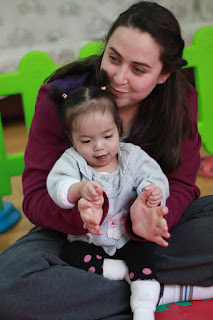For most of our caregivers and teachers, a crucial part of our day-to-day work is playing with the children. Peek-a-boo, pulling turnips, wheels-on-the-bus, hide-and-seek, are just a few of our all-time favorites.
Play is a lot of fun, but it is much more than that! For young children, most of their important learning takes place in play. We try to create every possibility for the children in our care to play. Over the years, we have seen firsthand how play transforms young lives, unlocks potential and nurtures the skills they need to thrive.
Play is the most natural way that young children learn and explore. When they build a tower with blocks or solve a puzzle, they learn to problem-solve and sharpen their thinking.
When they play ball games and giggle together outside, they learn to collaborate, to develop motor skills, and to exercise perseverance. When they spend hours digging holes in the garden or making mud pies, they are learning about nature and using their imagination and creativity.
Language and social skills flourish during play, too, for example when children discuss what to do and negotiate rules in play (“I'll be the mommy, you be the baby.”). When they are engaged in rough-and-tumble play, we see empathy and a sense of togetherness starting to take root.
Through play, children discover how the world around them works and how they fit in. When a little one holds a doll tight and pretends to bathe her gently, that child is re-experiencing her everyday life of love and care while imagining what it feels like to be a caregiver, to show compassion and to be responsible. This is an essential tool for emotional development.
For children who have faced trauma and loss, play provides a safe space to process their feelings and regulate their emotions. When a child dresses up as Ultraman and shouts “Believe in the light!”, he is exploring what it feels like to be courageous, to stand up to evil, and to be resilient.
Unfortunately, play does not come naturally for many children who have suffered from early deprivation and emotional neglect. Even if they are surrounded by toys, they are very likely to just examine the toys, toss them around, or grab them from their peers’ hands, rather than concentrating on them and playing collaboratively with others. Therefore, it is critical that we as adults invite children to play with us and model for them how to play.
Playing together gives us opportunities to model important skills like concentrating, problem-solving (“How can I get my tower even taller?”), and social skills (for example, turn-taking). We also help the children to co-regulate with us. We use our imagination and get creative together, until these things begin to come naturally to them.
Play is the foundation of learning and growth for children. We strive to give children the tools to learn, grow, and heal, and to create spaces that encourage joyful, purposeful play, so that they can become more confident, creative, and connected.










No comments:
Post a Comment